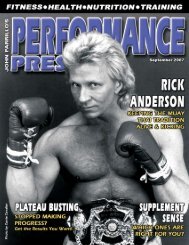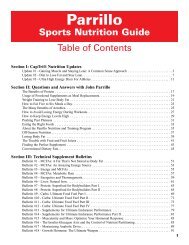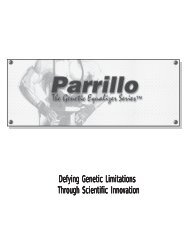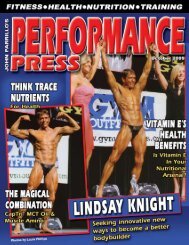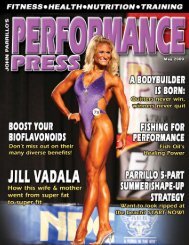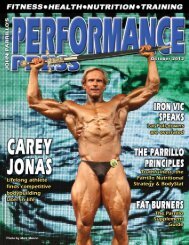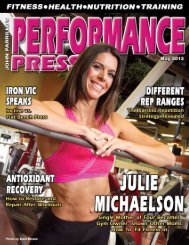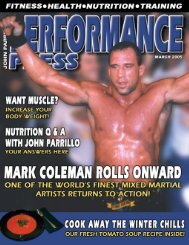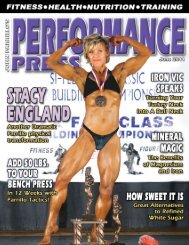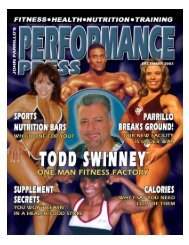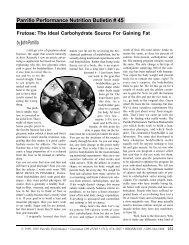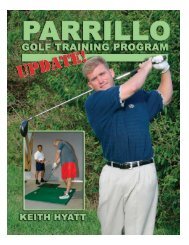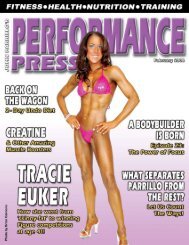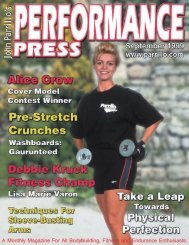A Monthly Magazine For All Bodybuilding, Fitness And - Parrillo ...
A Monthly Magazine For All Bodybuilding, Fitness And - Parrillo ...
A Monthly Magazine For All Bodybuilding, Fitness And - Parrillo ...
Create successful ePaper yourself
Turn your PDF publications into a flip-book with our unique Google optimized e-Paper software.
Lean Bodies<br />
Satisfy the Hunger<br />
Quench the Thirst<br />
Isn’t It Satisfying To Not Feel Hungary?<br />
By Cliff Sheats, M.S., Clinical Nutritionist<br />
On the <strong>Parrillo</strong> Performance Nutrition<br />
Program, you shouldn’t feel hungry<br />
- because you’re in a calorie surplus.<br />
Only when you’re not eating<br />
enough will you feel hungry.<br />
Plus, the fiber in whole grains and<br />
vegetables keeps you feeling full. So<br />
does the combination of foods in your<br />
meals.<br />
Some people on the program feel a<br />
little hungry at night when they’ve reduced<br />
- or cut out - their starchy carbohydrates<br />
at the evening meal. To counteract<br />
this, eat more fibrous carbohydrates<br />
at that meal, along with extra protein.<br />
A related issue is thirst - a signal<br />
you must not ignore. Drinking adequate<br />
water has some real benefits when<br />
you’re trying to get lean and muscular.<br />
First, water and fluids help your<br />
body store glycogen for use later as<br />
energy.<br />
Second, water assists your kidneys<br />
in effectively removing waste products<br />
from your system.<br />
Third, it also serves as a medium<br />
for every enzymatic and chemical reaction<br />
in the body, including digestion and<br />
fat-burning, and it transports nutrients<br />
and oxygen to every cell in the body.<br />
Fourth, research shows that low<br />
water intake may be a risk factor for cancers<br />
of the urinary tract, colon cancer,<br />
and breast cancer. One study found that<br />
patients with urinary tract cancer (bladder,<br />
prostate, kidney, and testicle) drank<br />
significantly smaller quantities of fluid<br />
compared with healthy controls. (1)<br />
More than 75 percent of your body<br />
is made up of water. You can survive<br />
without food for days, but, without water,<br />
dehydration begins in just a few<br />
hours. Next to oxygen, water is the substance<br />
most important for life.<br />
I recommend that you drink eight<br />
to 10 large glasses of water every day.<br />
One of the best sources is spring water<br />
because of its mineral content.<br />
Athletes have often asked me<br />
Water serves as a medium<br />
for every enzymatic and<br />
chemical reaction in the body.<br />
whether it’s healthy to drink diet soft<br />
drinks. Look at this way: Would you<br />
wash your clothes in Diet Coke? Of<br />
course not! Nor should you wash your<br />
body in it. Drink water!<br />
Then there’s the question of coffee<br />
and tea. Some people mistakenly<br />
believe that these beverages are good<br />
ways to get in enough water. Neither is<br />
a good source of water because they<br />
both contain caffeine, which adversely<br />
affects the brain and the nervous system.<br />
Physiologically, caffeine triggers<br />
the release of stimulating chemicals<br />
from the adrenal glands into the bloodstream,<br />
elevating blood sugar. In turn,<br />
this causes blood vessels to constrict<br />
and the blood pressure to go up by as<br />
much as ten percent.<br />
Coffee, in particular, also increases<br />
the output of stomach acid, which makes<br />
urine more acidic, and increases the excretion<br />
of magnesium, a vital mineral. A<br />
magnesium deficiency can cause nervousness,<br />
tight muscles, bone loss, and<br />
cardiac arrhythmias. There is also some<br />
evidence that coffee can inhibit the absorption<br />
of iron and the B-complex vitamin<br />
thiamine.<br />
If you are used to drinking coffee, I<br />
suggest that you gradually limit it. Once<br />
you start feeling more energetic on this<br />
program, your need for coffee should<br />
disappear.<br />
Reference<br />
1. Kleiner, SM. “Water: An essential<br />
but overlooked nutrient.” Journal<br />
of the American Dietetic Association<br />
(1999) 99: 200-206.<br />
22 John <strong>Parrillo</strong>’s Performance Press • June 2000 Orderline: 1•800•344•3404



